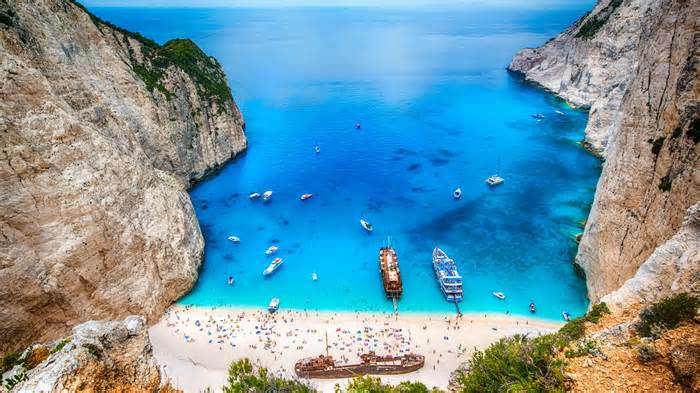A world-famous beach that Brits like to stop at every year will be closed for the second summer in a row.
Tourists have again been banned from visiting Shipwreck Beach, or Navagio Bay, on the paradisiacal island of Zakynthos, due to landslides.
Last year, the Greek government banned travelers from entering the beach and called for the paintings to be fixed after serious safety and security considerations arose amid ongoing seismic activity and landslides.
The ban has reportedly dragged on into this year, as the government continues to explore features to make the hotel safer.
Tourists will not be allowed to stop at the beach by land or sea, and boats or boats will not be allowed to dock along the bay.
Access to the most sensitive of cliffs, known to be a place famous for its panoramic views, is also prohibited.
G Stasinopoulos, mayor of Zente, said: “Hundreds of people already stop at the wreck every day to see the sights, but unfortunately there is no security. “
“This is what we have been shouting since the first day we headed into the area.
“Unfortunately, lately we’re seeing the precautionary symptoms pass and end up on the edge of the cliff.
“They are on the edge of the cliff, which is a very serious security issue.
“We scream that they are going to kill other people. We play with the protection of the guests.
“This must be avoided if we want the shipwreck to be the most vivid moment in Greece. “
The Ionian island of Zakynthos, also known as Zakynthos, is popular with young British partygoers.
For decades, more British than any other nationality have visited the Ionian Islands.
It is a popular vacation spot due to the sinking of the MV Panagiotis that ran aground in the bay in the 1980s.
The small sandbag is known for its cliffs and fabulous turquoise waters.
However, over the years, due to seismic activities, some cases have demonstrated the threat to the lives of tourists, adding to the collapse of cliff tops.
Successive landslides on the island have also raised concerns about beach protection.
In 2018, seven tourists were injured after chunks of the limestone cliff broke off and fell on them.
Hundreds of tourists, including many Britons, were lying on the beach in the sun’s rays when the landslide occurred.
A rescue operation followed and the injured were rushed to the island’s general hospital.
The plan to close the beach for protection and repair purposes was first followed by the Greek Ministry of Tourism last year.
It is based on a specialist recommendation provided by Professor Ethymios Lekkas, head of the country’s National Earthquake Planning and Protection Organization.
After examining the area, he pleaded for the beach to be declared off-limits, saying that previous attempts to demarcate spaces for visitors had failed due to a lack of good enough patrols.
“We have had successive landslides that are part of the natural process that feeds this place, the largest beach in Greece,” he said.
“We can’t rule out new, larger landslides. A twist of fate would be disastrous.
Acknowledging the uproar, Greek Tourism Minister Vassilis Kikilias said he is “the last person” who needs to see the mythical beach closed.
“But we have to pay attention to the experts. It would be remiss to continue otherwise,” he added.
“We cannot endanger the lives of citizens and travelers visiting Navagio Beach. “
©News Group Newspapers Limited in England No. 679215 Registered Office: 1 London Bridge Street, London, SE1 9GF. “The Sun”, “Sun”, “Sun Online” are registered trade marks or trade names of News Group Newspapers Limited. This service is provided under News Group Newspapers’ Limited’s popular terms and situations in accordance with our Privacy & Cookie Policy. To inquire about a license to reproduce material, please visit our distribution site. Check out our online press kit. For other requests, please contact us. To view all of The Sun’s content, please use the site map. Sun’s website is regulated through the Independent Press Standards Organization (IPSO).
Our sleuths check to be accurate, but we make mistakes. For more main points about our complaints policy and to register a complaint, please click on this link: thesun. co. uk/editorial-complaints/

